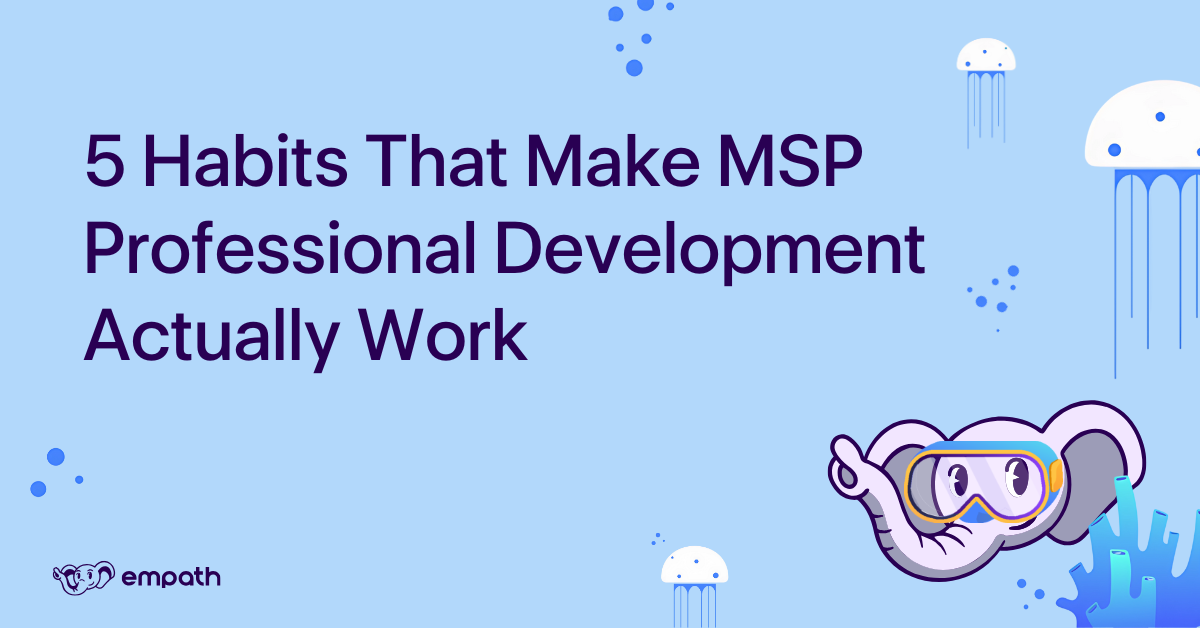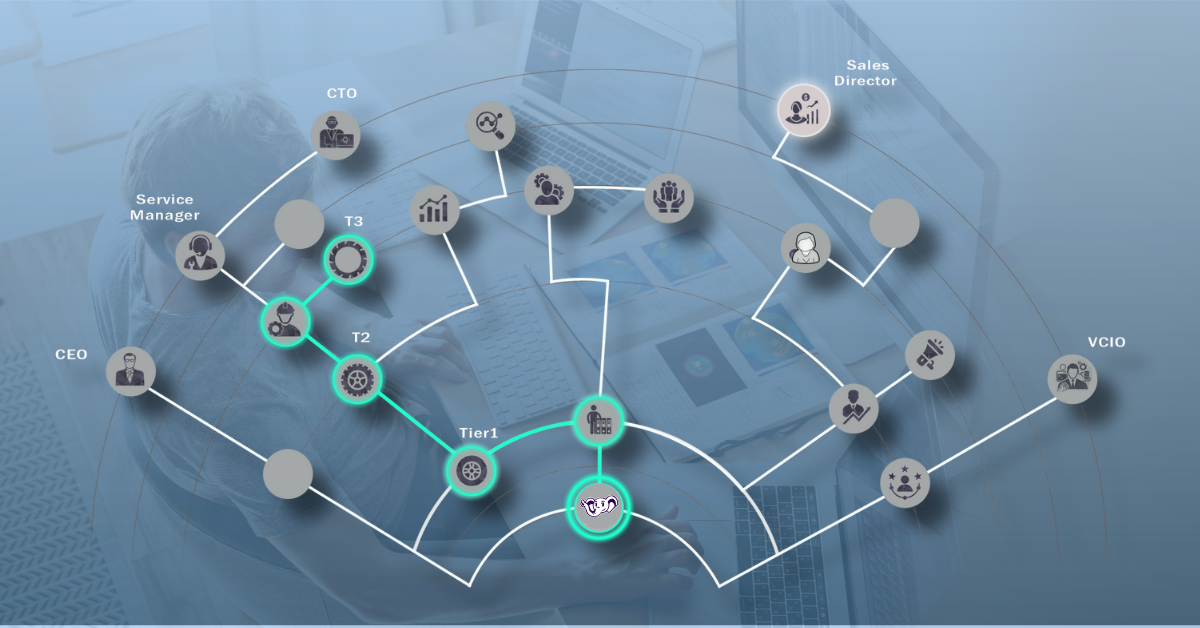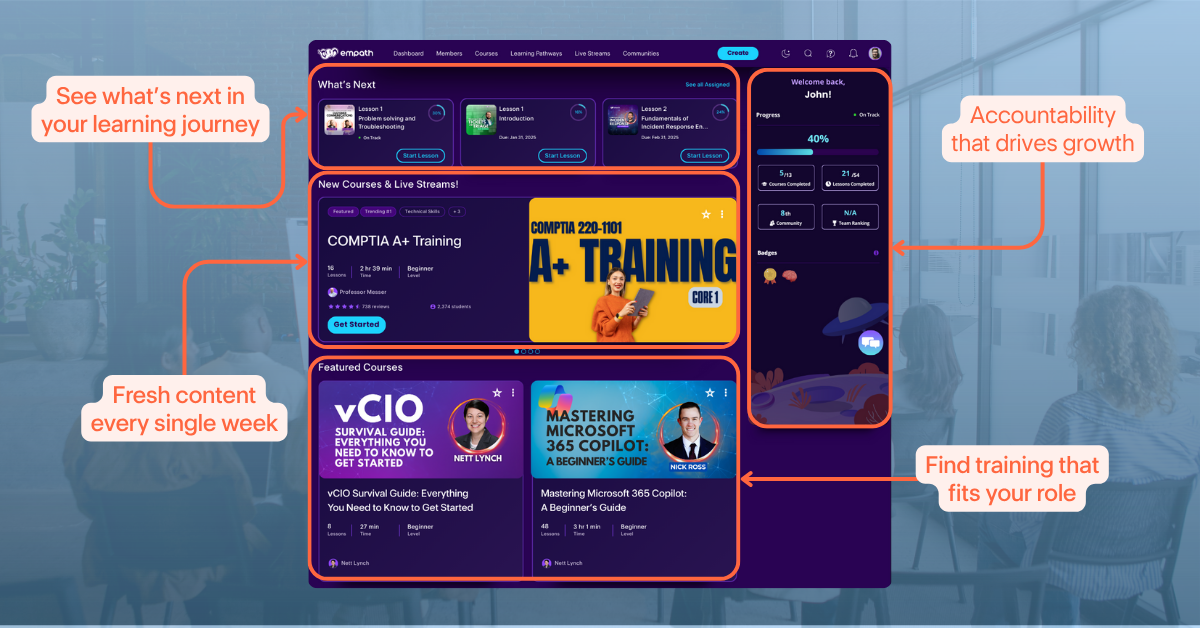5 Habits That Make MSP Professional Development Actually Work

If you're reading this, you probably think your MSP has a training problem, but you don't. You have a system problem. You buy the courses. You tell the team it’s important. Everyone nods and agrees.
And then… nothing.
It’s the same pattern over and over. “We didn’t have time.” The best intentions get buried under tickets and alerts. And six months later you’re wondering why your techs aren’t growing, your employee retention is suffering, and your best people are shopping their resumes.
Meanwhile, the highest-performing MSPs treat professional development like a business-critical system. Not a “nice-to-have.” Not a side project. Not something you do when it’s slow.
They build learning into the fabric of the business. It’s part of the culture. It’s part of operations. On purpose. By design.
Here’s the good news: you don’t need more time. You don’t need more money. You don’t need better content.
You just need a system. And here are the five habits we see every winning MSP use to make that system stick.
1️⃣ Systematize Your MSP Training Plan
Most teams fail here because they rely on good intentions. Training only happens when there’s nothing else on the service board. (Which, let’s face it, never happens.)
Winning MSPs take the guesswork out of it. They bake MSP training right into operations. Non‑negotiable.
They treat training just like a service ticket. They create recurring “training tickets” in their PSA, assigned to every employee. Now it’s scheduled, measurable, and protected. No more “we didn't have time.”
From day one, every employee is enrolled. Even the owner. Even the dispatcher. That sends a strong cultural signal and is a cornerstone of a healthy company culture: Learning isn’t optional here. It’s part of the job. And nobody knows it all.
One more tip: don’t overthink it upfront. Winning teams start everyone on a career pathway on day one, even if it’s not perfect. Why? Because momentum beats perfection every time.
2️⃣ Designate a "Training Captain"
Programs without owners fail. Every time.
One of the biggest differences we see is that the best MSPs name a “Training Captain.” This is the internal champion who owns the MSP professional development system.
And here’s the kicker; it’s not always the service manager. It’s not always the owner. Sometimes the best Training Captains are frontline techs, people who genuinely love learning and want to help others level up. That peer-led energy creates real buy-in. It feels less like a mandate and more like a movement.
What does the Captain actually do?
✅ Keep training on the calendar
✅ Check in with people who fall behind
✅ Be the go-to resource for the whole team
It’s not a full-time job, but its function is critical. This person owns accountability and ensures training stays a priority for everyone.
3️⃣ Make It Your Own
Yes, your MSP is a special flower. But no one cares, unless you actually train people on what makes you special.
The fastest way to get buy-in is to stop serving up generic courses no one relates to. Instead, bake your own knowledge and processes right into the platform.
That’s how you turn it from “just another training library” into the way we do things here.
Winning teams do this three ways:
– Upload your SOPs as trackable lessons.
– Record simple “Loom‑style” videos with your context on key topics.
– Supplement vendor provided content that shows your team how you have customized the tools you are using.
Now the team isn’t just checking off someone else’s boxes. They’re learning how to succeed at your MSP.

Like this? You'll love our newsletter.
Get our weekly emails packed with more expert insights, new courses, and community events you won't find anywhere else.
4️⃣ Create Accountability
Do you want to be good or great?
This separates the two. A plan without accountability is just a wish list.
The best MSPs close the loop by tying professional development directly to management. Managers review learning goals and progress during regular one‑on‑ones. They discuss where someone wants to go in their career and show exactly how the next pathway helps get them there.
That’s when it clicks. Training stops feeling like homework and instead like the clear path to their next promotion, a well-deserved pay raise, and the career advancement they've been working towards.
5️⃣ Make It Visible (and Fun)
Learning shouldn’t happen in a vacuum. The best teams turn it into a shared experience that strengthens their company culture.
Leaderboards. Public shout‑outs at weekly huddles. Celebrating milestones in Slack.
That creates positive pressure and healthy competition, a culture where personal growth is visibly rewarded.
The Bottom Line
Most MSPs don’t fail at training because they don’t care. They fail because it's not baked into their culture.
These five habits are how the best MSPs turn professional development from a chore into their biggest competitive advantage.
You need one place to run it all: design and assign custom training pathways, embed your own SOPs so learning actually sticks, and track progress you can bring straight into 1:1s and career conversations.
That’s your accountability engine. And we built it for you.
Ready to see it in action? Book a demo with the Empath team and we’ll walk you through how our platform makes this entire framework easy to run.


.png?noresize&width=590&name=Deep%20Dive%20-%20Blog%202%20(4).png)
.png?noresize&width=590&name=Deep%20Dive%20-%20Blog%202%20(2).png)
.png?noresize&width=590&name=Deep%20Dive%20-%20Blog%202%20(3).png)